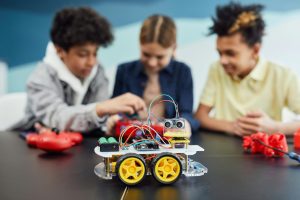Emotional Intelligence: Building Stronger School Communities
In today’s society, the focus on academic achievement and test scores often overshadows the importance of social and emotional learning in schools. However, research has shown that Emotional Intelligence (EI) is a crucial factor in students’ success and well-being. As educators, it is our responsibility to not only teach academic subjects but also to foster a positive and emotionally supportive learning environment. In this article, we will explore the concept of Emotional Intelligence and how it can be used to build stronger school communities.
The Importance of Emotional Intelligence in Schools
Emotional Intelligence is the ability to recognize and regulate one’s emotions and understand the emotions of others. It involves being able to empathize, manage stress, and maintain healthy relationships. These are essential skills that students need to develop in order to navigate through life successfully.
In schools, EI is often overlooked as a crucial component of education. However, research has shown that students with high EI are more likely to have better academic performance, improved mental health, and stronger relationships with their peers and teachers. On the other hand, students with low EI may struggle with social and emotional challenges that can hinder their academic growth and well-being.
Ways to Build Emotional Intelligence in Schools
Implement Social-Emotional Learning Programs
Social-Emotional Learning (SEL) programs are designed to teach students the skills needed to manage emotions, build relationships, and make responsible decisions. These programs are often integrated into the curriculum and provide a structured way for students to develop their Emotional Intelligence. SEL programs also help create a positive and inclusive school culture where all students feel valued and supported.
Encourage Open Communication
Effective communication is a crucial aspect of Emotional Intelligence. As educators, we must encourage open communication in our classrooms and school communities. This involves creating a safe and inclusive environment where students feel comfortable expressing their feelings and thoughts. By fostering open communication, we can help students develop their emotional awareness and enhance their social skills.
Lead by Example and Practice Empathy
As the saying goes, “Children learn what they live.” This also applies to developing Emotional Intelligence. As educators and role models, we must lead by example and practice empathy in our interactions with students and colleagues. By showing empathy, we can model for our students how to understand and regulate their own emotions, as well as how to respond empathetically to the emotions of others.
Integrate Emotional Intelligence into Lessons
Teachers can also incorporate lessons and activities that promote Emotional Intelligence into their curriculum. For example, discussions about emotions and how to express them can be woven into literature, art, or history lessons. These activities not only help students develop EI, but they also make learning more meaningful and relatable.
The Impact of Emotional Intelligence on School Communities
Emotional Intelligence not only benefits individual students but also has a positive impact on the entire school community. When students develop their EI, they are more likely to have positive relationships with their peers and teachers. This leads to a safer and more inclusive school environment where students feel a sense of belonging. Furthermore, by focusing on EI, we can also reduce conflict and bullying, ultimately creating a more peaceful and productive learning environment.
Conclusion
In conclusion, Emotional Intelligence is a crucial factor in building stronger school communities. By implementing social-emotional learning programs, encouraging open communication, leading by example, and integrating EI into lessons, we can help our students develop the necessary skills to thrive academically and emotionally. As educators, it is our responsibility to prioritize and foster Emotional Intelligence in our students to create a positive and inclusive learning environment for all.










